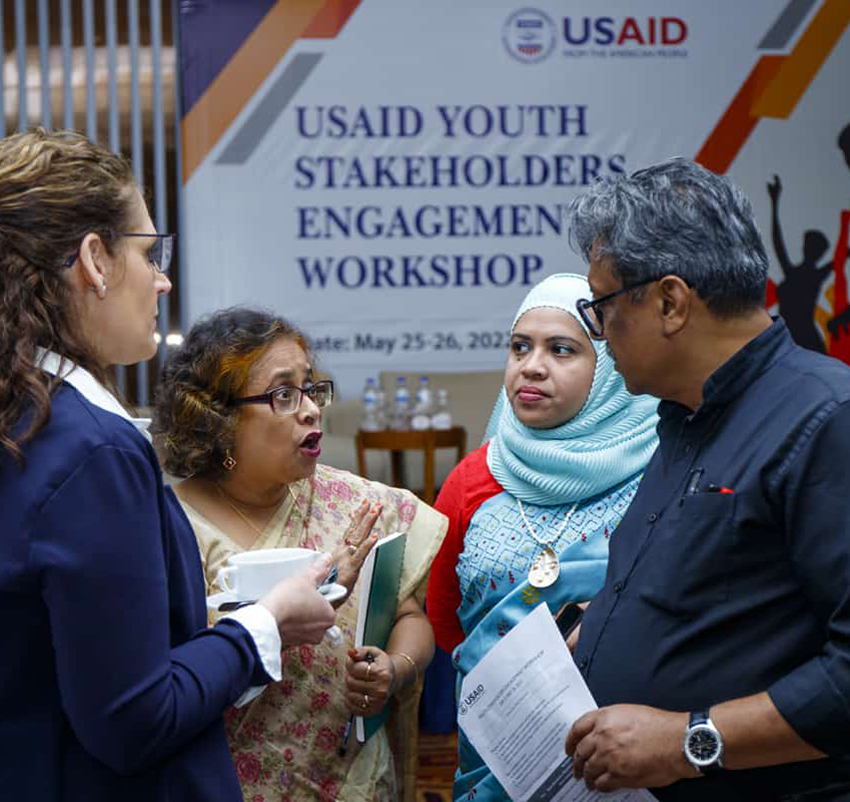
By Monica Jerbi, ME&A Communications Manager
A high priority for ME&A for 2023 is responding to USAID’s renewed commitment to creating space for local communities to determine their own development priorities, manage development program design and implementation, and measure results.
“ME&A has been listening to local voices and leveraging local partnerships and talent for years. As USAID was developing its new Local Capacity Development Policy, our biggest challenge was adapting how we already empower local actors to deliver and sustain development results into more of a systems approach,” said ME&A President and CEO Teresita Perez. “We wanted to ensure ME&A is fully prepared to respond to USAID’s call for developing local capacity within local systems – beyond individual organizations in isolation – at low risk to USAID.”
Last year ME&A put together a team led by Randal Joy Thompson, Ph.D., a capacity-building expert, to develop ME&A’s new Performance Improvement of Local Systems (PILS) approach. PILS uses a systems approach to break down the barriers that can thwart local communities from exercising and benefiting from their own development expertise and leadership.
PILS was designed in eight phases using a convenor – chosen for skills in conflict resolution and in facilitating consensus – to lead local actors through the local capacity development process:
- Identify the system and local actor perspectives
- Understand the system
- Diagnose the system challenge (i.e., root cause analysis)
- Create a vision that local actors share that catalyzes the process of capacity development and performance improvement
- Select interventions to further build capacity and improve system performance
- Draft a systems theory of change
- Carry out organizational development and performance improvement to empower locals within the system to lead development program design, implementation, and results measurement
“A local system is made up of a set of interconnected actors who jointly produce a particular development outcome. These actors include individuals, organizations, and networks across different geographic scales and can be indigenous or external like USAID and its implementing partners,” Perez said. “A major PILS focus is helping local communities map local systems, understand the thought processes driving how actors within the system work with each other or even work at cross purposes, and then identify where interventions are needed.”
At the start, the convenor interviews system stakeholders to better understand how the system functions, stakeholder perspectives, and issues of concern. Then the convenor helps these local actors meet to develop a common understanding of the system, see their role in system performance, understand how their relationships help determine whether the system is performing as designed, diagnose system challenges the community needs to address, and create a vision for moving forward.
Paths to full system potential include modifying relationships; shifting the values, perspectives, and norms driving the system; altering the system structure and goals and rules behind it; and changing how information flows within the system, how money changes hands, or how inventories are handled.
“In some cases, PILS could involve coordination with other donors and host-country governments at national, regional, or local levels. Sometimes donors will fund incompatible and duplicative programs in the same country or collectively stretch resources inequitably across communities,” Perez said. “Working with other donors on what they are doing or planning and connecting these plans to community and government priorities can be a cost-effective way to increase sustainable development outcomes while closing coverage gaps.”
In some cases, local actors determine that one or more organizations that comprise the system should undergo a complex organizational development process. When this happens, ME&A uses an organizational development approach with roots in the International Society for Performance Improvement (ISPI) model, which is similar to USAID’s Human and Institutional Capacity Development (HICD) approach.
“The reality is the nimble, innovative, and diversity-oriented corporate cultures of small businesses like ME&A have prioritized equitable, locally led development for years,” said ME&A Vice President Loren Schulze, Ph.D. “By working with U.S. small businesses using methodologies like PILS, USAID can meet both its small business and Local Capacity Development goals while minimizing potential fiduciary risks.”







